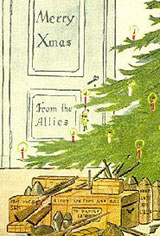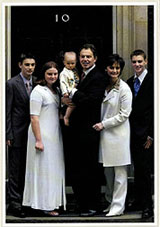
The
consummate politician scrutinises every event for possible political
capital, and the sending of the Christmas card is no exception.
The Christmas card can be a powerful instrument - whether for
propaganda purposes, keeping the party faithful sweet or granting
a select few an insight into a prime minister's private life.
Since the first Christmas card was printed and distributed in
London in 1843, the official card has become a staple of any politician's
festive activities.
The venerable Abraham Lincoln was the first US president who
saw political mileage in the Christmas message, and in the process,
immortalised the figure of Santa.
During the American Civil War, which pitted the slave-owning
South against the government union of the North, the then president
requested a political cartoonist, Thomas Nast, to illustrate Santa
with the Union troops in an attempt to bolster their spirits.
Mr Nast was the first to introduce a fat Santa in the now-traditional
red suit and big leather belt.
Seeing this jolly fellow side with the North was allegedly very
demoralising for the southern forces. They lost not very long
after.
The allied governments also made use of the Christmas message
to buoy the spirits of those in occupied states during World War
II, promising assistance in humorous cards.
And indeed it was only in this period that the Christmas card
tradition really took hold among US presidents - who to this day
are among the world's most conscientious card senders.
But unlike their forefather Abraham Lincoln, who set out to deliberately
hurt some feelings, modern US presidents have taken extreme care
not to offend any sensibilities with their Christmas message.
Indeed none of the recipients will be wished a "Merry Christmas"
- that is far too exclusive and potentially offensive to the recipients
who celebrate Hanukkah, Diwali or nothing at all. Instead a "holiday
card" is despatched.
Mr Bush, a devout Christian, has in fact broken with tradition
for the second year in a row by including a quotation from the
bible, but his very secular image is unlikely to cause offence.
Some 1.5 million people have been the recipients of cards this
year from George and his wife Laura, breaking the last presidential
record of one million, set by the Bushes last year.
The exercise has less to do with festive spirit than it is a
party-political postal blitz.
Certainly those recipients of the Bushes' Christmas card may
feel less special when they discover that the same card is sitting
on hundreds of thousands of other mantelpieces across the world.
Politicians intent on keeping their card special can go for one
of two options.
Firstly they can, quite literally, keep their cards close to
their chest.
Attempts to obtain a copy of German Chancellor Gerhard Schroeder's
Christmas card met a frosty response in Berlin.
"They felt that to allow the chancellor's card to be published
on a website would diminish the honour of receiving a card from
the chancellor," explained an embassy spokesman. "To
receive a card should be an honour."
Or, world leaders could decide to do as UK Prime Minister Tony
Blair has done and despatch two cards.
 One,
featuring a relaxed portrait of the whole family, has been sent
to friends.
One,
featuring a relaxed portrait of the whole family, has been sent
to friends.
Another, featuring just Tony and his wife Cherie, has been sent
to a wider audience - although not on the scale of the US president.
One problem with this option is the tiering of the recipients.
The double Christmas greeting has apparently prompted jealous
exchanges as politicians seek to find out who has got which.
But the main objection observers have raised to Mr Blair's cards
is the alleged double standards he displays by featuring his family,
whose privacy he has always sought to defend from "media
intrusion".
The prime minister had apparently hoped to circumvent this complaint
through despatching two cards, but to no avail.
So is all this fuss and expense really worth it?
Some heads of state have decided that it is not. Nigeria is a
case in point.
"The president doesn't send out official cards any more,"
said a Nigerian spokesman.
"It's too expensive and just not necessary."
(Agencies)
